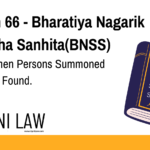Code: Section 65 BNSS
(1) Service of a summons on a company or corporation may be effected by serving
it on the Director, Manager, Secretary or other officer of the company or corporation, or by
letter sent by registered post addressed to the Director, Manager, Secretary or other officer
of the company or corporation in India, in which case the service shall be deemed to have
been effected when the letter would arrive in ordinary course of post.
Explanation.—In this section, “company” means a body corporate and “corporation”
means an incorporated company or other body corporate registered under the Companies
Act, 2013 or a society registered under the Societies Registration Act, 1860.
(2) Service of a summons on a firm or other association of individuals may be effected
by serving it on any partner of such firm or association, or by letter sent by registered post
addressed to such partner, in which case the service shall be deemed to have been effected
when the letter would arrive in ordinary course of post.
Explanation of Section 65 BNSS
Key Provisions
- Service on Companies and Corporations
- Summons can be served directly on a company’s officials (Director, Manager, Secretary).
- It can also be sent via registered post to these officials.
- The summons is deemed to be served when it would normally arrive by post.
- Service on Firms and Associations
- Can be served on any partner of the firm or association.
- Can also be sent via registered post to the partner.
- Again, the summons is considered served when the letter arrives.
- Legal Recognition of Service
- Even if a company or firm refuses to acknowledge the summons, it is still deemed served once it arrives by registered post.
- Ensures companies, firms, and associations cannot evade legal obligations.
Illustration of Section 65 BNSS
Example 1: Summons on a Company
A summons is issued to XYZ Pvt. Ltd. regarding a fraud investigation.
- The summons is sent via registered post to the Director’s office.
- The post is delivered but the company refuses to acknowledge it.
- Legally, the summons is still deemed served as per Section 65 BNSS.
Example 2: Summons on a Partnership Firm
A fraud case is filed against ABC & Co., a partnership firm.
- The summons is hand-delivered to one of the partners, Mr. A.
- The firm claims only Mr. B can accept it.
- As per Section 65 BNSS, the summons is validly served on any partner.
Example 3: Service via Post
A legal dispute involves MNO Corp., a registered society.
- The summons is sent via registered post to the Secretary’s office.
- Even if the Secretary does not personally collect it, the summons is still deemed served when delivered.
Common Questions and Answers on Section 65 BNSS
1. Can a company refuse to accept a summons?
🚫 No. If sent via registered post, the summons is legally deemed served even if the company refuses to acknowledge it.
2. Who can receive a summons on behalf of a company?
✅ Any official such as the Director, Manager, Secretary, or other officer.
3. Can a summons be served on a partnership firm through any partner?
✅ Yes. Serving a summons on any one partner is legally considered service on the entire firm.
4. What if a company changes its office address?
✅ If the summons is sent to the last known official address, it is still valid unless the company officially notifies a change of address.
5. Can an employee (not a partner) accept a summons for a firm?
🚫 No. It must be served only on a partner or sent via registered post to a partner.
Conclusion
Section 65 BNSS ensures smooth legal proceedings by:
✅ Preventing corporations, firms, and societies from avoiding summons,
✅ Allowing service through registered post, and
✅ Treating service as valid even if not acknowledged.
For more legal insights, visit ApniLaw today! 🚀










